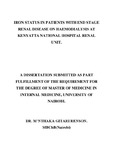| dc.description.abstract | Background
Iron deficiency is an established association to the anaemia of chronic kidney disease. In
chronic kidney disease, causes of anaemia are diverse; the main causes being the reduced
production of erythropoietin as the renal function progressively deteriorates and associated
abnormal changes in iron metabolism. In patients with end stage renal disease, anaemia is
virtually a universal occurrence. In addition, in patients with end stage renal disease on
haemodialysis, iron deficiency is the most frequent cause of anaemia despite treatment with
erythropoietin.
There is no local data currently, looking at the iron status of the patients with end stage renal
disease on haemodialysis despite evidence that correction of anaemia not only reduces
mortality and morbidity but also improves the quality of life. This study seeks to establish the
iron status of patients with end stage renal disease on haernodialysis and subsequently will
form a basis for future objective clinical and laboratory interventions in patient care.
Objectives
The aim of the study was to determine the iron status, prevalence of anaemia and iron
deficiency anaemia in patients with end stage renal disease on haemodialysis at Kenyatta
National Hospital renal unit.
Study Design - A descriptive, cross sectional study.
Setting - Renal Unit, Kenyatta National Hospital.
Methodology
A cross sectional survey was carried out involving 165 patients with end stage renal disease
on haemodialysis recruited sequentially at the Kenyatta National Hospital renal unit over a
period of four months. These patients had their demographics, socio-economic details, as
well as clinical history that included: aetiology of chronic kidney disease, date of
commencement of haemodialysis, number of haemodialysis weekly sessions as well as use of
iron, erythropoietin, blood transfusion or any other medications documented in a study
questionnaire. A structured physical examination was carried out.
IX
At enrolment, 8 millilitres of blood was drawn. 5 millilitres was put in a plain vacutainer for
measurements of serum iron, ferritin, transferrin and total iron binding capacity. 3 millilitres
was put in an ethylene diamine tetra-acetic acid vacutainer for measurement of full
haemogram and erythrocyte sedimentation rate as well as for the peripheral blood film.
Results
One hundred and sixty five patients on stable maintenance haemodialysis were recruited into
the study. Mean age was 45years ± l6SD. Males were 60.6%(100), females were 39.4%(65).
Majority of the patients (81.5%; 135) were receiving haemodialysis once per week. Only
53.3%(98) patients were taking erythropoietin while 50.3%(83) were taking iron sucrose. On
general examination, 99.4% of the patients were pale.
Mean haemoglobin was 7.7g/dl ± 1.9SD. Notably, 98.2%(162) of the patients had anaemia
while 87.9% of the patients had an haemoglobin less than llg/dl which was the
. recommended minimum haemoglobin target for end stage renal disease patients on treatment
for anaemia. In terms of iron status assessment, 35.2%(58) had low iron status, 36.4% had
normal iron status, 26.1 %(43) had functional iron deficiency while 2.4%(4) had iron
overload. Iron deficiency anemia was observed in 34.5%(54) of the study patients.
Predictors of iron deficiency from this study included not using erythropoietin, low levels of
serum iron and transferrin levels as well as no prior history of blood transfusion.
Conclusion
Anaemia and iron deficiency are common in patients with end stage renal disease at Kenyatta
National Hospital Renal Unit despite the current therapeutic measures. | en |
| dc.description.department | a
Department of Psychiatry, University of Nairobi, ; bDepartment of Mental Health, School of Medicine,
Moi University, Eldoret, Kenya | |

